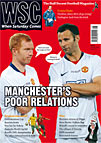 Phil Town analyses the plight of Boavista in the last decade
Phil Town analyses the plight of Boavista in the last decade
The turn of the century was very kind to Boavista FC. They had finished second two years earlier but still surprised everyone in Portuguese football by winning the title in 2001 – only the second team outside the Três Grandes (FC Porto, Benfica and Sporting) to do so, the other being Belenenses in 1946. Around this time, they were also putting in very respectable performances in Europe, the highlight a UEFA Cup semi-final in 2003 which Celtic just shaded. Paradoxically, however, it was this purple period that was a key contributing factor to Boavista’s current plight.
One of the ten stadiums to be used for Euro 2004, the Bessa XXI was completed in time for the club’s centenary in 2003. It cost around €45million (£38m), €7.5m of which was stumped up by the state. But the club, heady on its success, had seriously overstretched itself with the stadium, and the income wasn’t there to fill the financial hole. While the Três Grandes had, at least on paper, 100,000 or more sócios (fee-paying members), Boavista struggled to reach 20,000. The 30,000-seater Bessa was rarely more than a third full. Meanwhile, in the mid-Noughties, stories began to emerge of difficulties in paying money due to former players, most notably Martelinho, a hero of the 2001 title team. These debts were the least of the club’s worries, though. The taxman and social security were on the club’s tail for payment of over €5m owed.
In August 2008, the tax authorities seized the Bessa and put it up for public auction at €29m. Boavista managed to secure a PEC (an extra-judicial conciliation procedure) involving the promise to pay debts over time, which enabled the club to circumvent the seizure and register to compete in the professional leagues last season. As if the financial problems were not enough, however, Boavista was dealt a massive blow by the Apito Dourado (Golden Whistle) ref-bribing case. Apito Final (brought by the league), an offshoot of the criminal action going through the courts, found Boavista guilty of influencing referees and banished them to second tier.
Cash flow dried up: television money and revenue from sponsorship and advertising all shrank in the lower division, and gates were minuscule. Greenhorns from the youth teams were drafted in, as were veterans with dodgy knees. They were paid only intermittently. It was a recipe for failure; the team finished second from bottom and were relegated.
Then in June this year, the league offered a lifeline. The Apito Final process found Vizela and Gondomar also guilty of corruption, dating back to 2002-03. Gondomar had finished bottom of the second division but Boavista could take Vizela’s place.
Could but won’t. The PEC established in 2008 was terminated at the end of June, leaving Boavista with no alternative but to accept their fate: playing their football in the non-professional third tier next season.
Who is to blame for the fall from the top of the tree to the roots in just eight years? All fingers are pointed at the Loureiro mini-dynasty: local businessman and politician Valentim Loureiro and his son João, the vocalist with 1980s pop-rock group Ban, now a lawyer. Valentim was club president from 1972 until handing over the reins to João in the mid-1990s. João stood down in 2007.
Valentim was directly involved in the charges of corruption that led to Boavista’s relegation in 2008, while João can be blamed, at the very least, for incompetent management during his time at the helm. An audit carried out at the club in 2008 showed up a deal in which the club had sold space in the stadium to a company for €4m. On the same day, the company sold the space on to a chain of gyms for €13m. Current club president Álvaro Braga Júnior admits that the club’s debts total between €75m and €80m.
Fears are that Boavista will go the way of neighbours Salgueiros, whose senior team was extinguished under similar circumstances in 2005. Salgueiros has been reborn in the form of Sport Clube Salgueiros 08 (with a badge depicting a phoenix rising from the ashes) but they have had to start from scratch in the Porto district leagues. Boavista haven’t sunk quite so far just yet, but the future is looking extremely bleak.
From WSC 270 August 2009